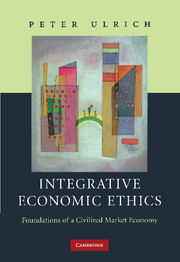Book contents
- Frontmatter
- Contents
- List of figures
- Preface
- Translator's note
- Introduction: orientation in economic-ethical thinking
- Part I Fundamental concepts of modern ethics and the approach of integrative economic ethics
- Part II Reflections on the foundations of economic ethics I: a critique of economism
- Part III Reflections on the foundations of economic ethics II: rational economic activity and the lifeworld
- 6 The question of meaning: economic activity and the good life
- 7 The question of legitimation: economic activity and the just social life
- Part IV A topology of economic ethics: the ‘sites’ of morality in economic life
- Bibliography
- Index of subjects
- Index of names
7 - The question of legitimation: economic activity and the just social life
Published online by Cambridge University Press: 22 September 2009
- Frontmatter
- Contents
- List of figures
- Preface
- Translator's note
- Introduction: orientation in economic-ethical thinking
- Part I Fundamental concepts of modern ethics and the approach of integrative economic ethics
- Part II Reflections on the foundations of economic ethics I: a critique of economism
- Part III Reflections on the foundations of economic ethics II: rational economic activity and the lifeworld
- 6 The question of meaning: economic activity and the good life
- 7 The question of legitimation: economic activity and the just social life
- Part IV A topology of economic ethics: the ‘sites’ of morality in economic life
- Bibliography
- Index of subjects
- Index of names
Summary
From its beginnings economic activity has been a social event. The cooperative process of creating value based on division of labour and the interpersonal distribution of the goods produced has always been the focal point of social conflict. The same is true for the side-effects of the accompanying production of ‘ungoods’ or evils (such as, for example, environmental pollution). Decisions on conflicting claims can, in principle, be taken in two ways: either in accordance with the principle of power (‘might is right’) or in accordance with the moral principle. A third way, involving neither power nor morals, such as the advocates of economism believe they have found with the harmonistic fiction of a pure market solution, does not exist. As we have seen, the approach of the latter is only an ideologically disguised variant of the power principle, in which the status quo of vested rights is from the beginning ‘methodologically’ excluded from all critical questioning of the justice of claims. In contrast, the moral principle subjects the regulation of conflicting claims and interests to the requirements of justice.
Regardless of the way it is defined in particular cases, the concept of justice takes up the issue of the quality of interpersonal or social relationships in the light of the moral rights of all persons – a category already introduced, which we will clarify more precisely in what follows. A rather more specific meaning must be attributed to the concept of legitimacy.
- Type
- Chapter
- Information
- Integrative Economic EthicsFoundations of a Civilized Market Economy, pp. 216 - 268Publisher: Cambridge University PressPrint publication year: 2008

